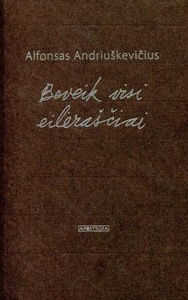Almost all of Alfonsas Andriuškevičius 1
In brief: What I find interesting in the Lithuanian literary history are the people who write without having a philological education, for example: graphic artist Jurga Ivanauskaitė, art critic Kristina Sabaliauskaitė, physicist Ričardas Gavelis or philosopher Dalia Staponkutė. Such writers have a distinct way of understanding literature. Art critic Alfonsas Andriuškevičius can also be put next to the authors without philological education.
Alfonsas Andiurškevičius' latest book Almost all the poems (Beveik visi eilėraščiai, Apostrofa, 2015) appeared among the 12 most creative books and it fits every reader. After all, there is a lot to choose from – the book is a collection of poems. Perhaps, the most puzzling thing is that it is hard to notice a clear program of the poet, but it is easy to recognize that A. Andriuškevičius is an art critic. The author captures moments sensitively and as an artist aptly conveys a mood, color or an idea through words.
A. Andriuškevičius' forte is his art critic's experience which complements the literary texts. Author has a great intuition that allows to highlight the visualization of the text. He emphasizes the semantics of color, which creates the thought of the subject and emphasizes experiences. Author sensitively looks at the environment, captures and stores its details in his mind and contains precious memories in a lucid memory.
A. Andriuškvičius reflects on his feelings and experiences in a sincere way, but presents them for the reader in a subtle and reserved manner ("Oh, I do not love anything! Who needs love / When the horizon is superimposed so perfectly, When snow is as white as the seamy side of black / when not a single sound sprouts in silence, / lying in it (up to time) as seed of anger lies in good," p. 38). The thoughts are recited in a concentrated manner. Often they fit into two, three, four or six lines.
Thus, the latest A. Andriuškevičius' book Almost all the poems proves that the art critic's look can enrich literature, paint it in different colors and allow the reader to experience visual art through the literary field. Even if the reader will not recognize poet's unified program in the collection, he or she will really notice a sensitive perception of the world and the ability to figuratively give meaning to reality and its vicissitude by using poetic means.









